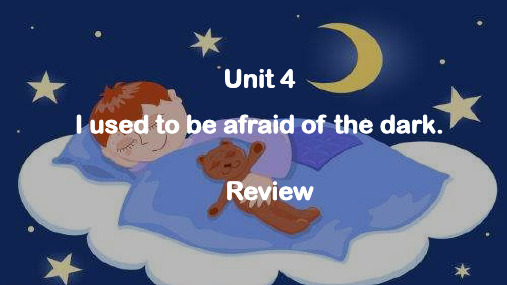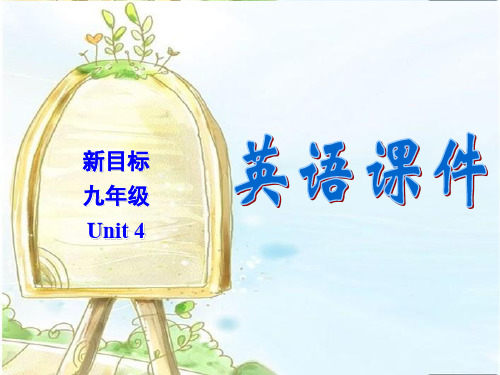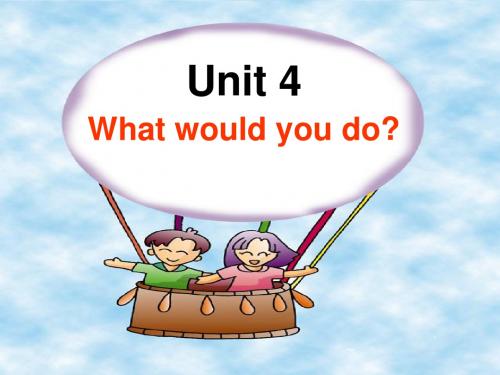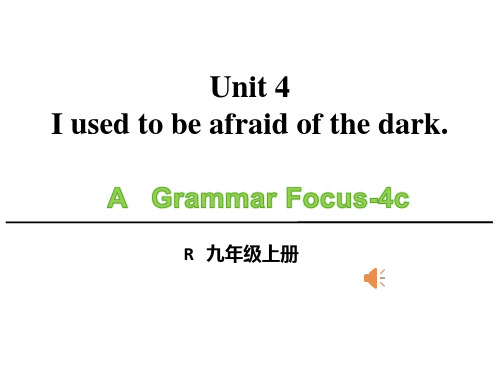新目标九年级英语unit4单元整体精品PPT课件
合集下载
Unit 4 (单元复习课件)-九年级英语全一册(人教新目标Go for it!)

change and how it happened
审题 1.审主题: 我的变化 2. 审体裁: 说明文 3.审人称: 第一人称 4.审时态: 一般过去时,一般现在时 5. 审要点: 过去与现在的对比
Writing
Follow the prompts to write an article to talk about your change.
A.Even
B.Even though C.If
D.Unless
(A)4. You can made a _____ instead of him.He doesn't have to go
there_____ person.
A.decision;in B.decide;in C.decision;by D.decide;by
05 Writing
Writing
Write about how you have changed. What did you use to be like? Which change is the most important one and why?
Try to write two paragraphs. Paragraph 1: General introduction about the changes in your life Paragraph 2: The most important
Language points
Point 7.Now she’s not shy anymore and loves singing in front of crowds. not ... anymore = no more,不再 e.g:He doesn't come late anymore.
审题 1.审主题: 我的变化 2. 审体裁: 说明文 3.审人称: 第一人称 4.审时态: 一般过去时,一般现在时 5. 审要点: 过去与现在的对比
Writing
Follow the prompts to write an article to talk about your change.
A.Even
B.Even though C.If
D.Unless
(A)4. You can made a _____ instead of him.He doesn't have to go
there_____ person.
A.decision;in B.decide;in C.decision;by D.decide;by
05 Writing
Writing
Write about how you have changed. What did you use to be like? Which change is the most important one and why?
Try to write two paragraphs. Paragraph 1: General introduction about the changes in your life Paragraph 2: The most important
Language points
Point 7.Now she’s not shy anymore and loves singing in front of crowds. not ... anymore = no more,不再 e.g:He doesn't come late anymore.
九年级英语_Unit_4_What_would_you_do全单元课件_人教新目标版

present. What if everyone else brings a present? • What if… “如果……怎么办?”相 当于 what would happen if… • E.g. What shall I do if it snows?
I get nervous before big parties and then I get pimples. They look terrible! What should I do?
a The food you eat could help with this
problem. You should eat lots of fruits and vegetables and drink lots of water.
I were you , I would go at
也就是说虚拟语气表示和现实的事实 相反时,从句用一般过时。 主句wouldshould//could/might +动词 原形 if …一般过去时/were…
• 1.If I had time, I would go for a walk. • 2.If I were invited, I would go to the dinner party. •3.If I won a million dollars in the lottery, I would put it in the bank.
S: That‟s a good idea. I‟ll try to do what you said.
4 We meet problems every day .Work in groups
to ask others’ problems and give advice. Then Report the result according to your survey.
I get nervous before big parties and then I get pimples. They look terrible! What should I do?
a The food you eat could help with this
problem. You should eat lots of fruits and vegetables and drink lots of water.
I were you , I would go at
也就是说虚拟语气表示和现实的事实 相反时,从句用一般过时。 主句wouldshould//could/might +动词 原形 if …一般过去时/were…
• 1.If I had time, I would go for a walk. • 2.If I were invited, I would go to the dinner party. •3.If I won a million dollars in the lottery, I would put it in the bank.
S: That‟s a good idea. I‟ll try to do what you said.
4 We meet problems every day .Work in groups
to ask others’ problems and give advice. Then Report the result according to your survey.
新目标九年级Unit4PPT精品文档18页

give it to charity, buy snacks, put it in the bank,_______________________________ ___________________________________ _________________________________
【温馨提示】 初中阶段我们只要掌握“与现在事实
相 反虚的拟虚情拟况”即从可句。其句主式句结构见下表:
与现在事 If +主语+ 主语+would
实相反 动词过去 (should, could,
式
might) +动词原形
(注意:当从句中的谓语动词是be动词
【经典例句】 If I were in the lion’s cage, I’d call for help. 如果我在狮子笼里,我会大喊救命。 If I had a million pounds, I’d give it to charities. 如果我有100万英镑,我要捐给慈善机构。
Other opinions: I’d buy a beautiful car. I’d build a research lab. I’d give it to the Hope Project. I’d travel around the world. I’d give it to medical research. ...
新目标 九年级 Unit 4
Unit 4 What would you do? Section A Period 1
(1a-1c)
Language Goals (学习任务)
1. Knowing: million, medical, research.
【温馨提示】 初中阶段我们只要掌握“与现在事实
相 反虚的拟虚情拟况”即从可句。其句主式句结构见下表:
与现在事 If +主语+ 主语+would
实相反 动词过去 (should, could,
式
might) +动词原形
(注意:当从句中的谓语动词是be动词
【经典例句】 If I were in the lion’s cage, I’d call for help. 如果我在狮子笼里,我会大喊救命。 If I had a million pounds, I’d give it to charities. 如果我有100万英镑,我要捐给慈善机构。
Other opinions: I’d buy a beautiful car. I’d build a research lab. I’d give it to the Hope Project. I’d travel around the world. I’d give it to medical research. ...
新目标 九年级 Unit 4
Unit 4 What would you do? Section A Period 1
(1a-1c)
Language Goals (学习任务)
1. Knowing: million, medical, research.
人教新目标英语九年级上Unit 4 What would you do课件

(2)would rather do sth.=had rather do sth. 宁愿做…,较喜欢做… Would rather do sth. than do sth. =prefer to do sth. rather than do sth. 宁愿做…而不愿做… e. g. • I would rather drink green tea than coffee. • I’m rather bored than tired.
D. Confident If you are confident, you are sure that you can do something or deal with a situation successfully.
E. Creative If you are creative, you use your imagination or skills to make things.
parties.
3. — I can’t sleep the night before I take a big exam. Then I’m too tired to do well. What should I do? — If I were you, I’d do some
sports or drink s入声音)
Girl1: I just did a personality survey in Teen Time magazine. It tells you how confident you are. Boy1: Oh? How did you do, Celia? Girl1: I don’t know yet. But it’s a really interesting test. You should try it, Bill.
2014_新目标_九年级英语_unit_4_I_used_to_be_afraid_of_the_dark_Section_A全课件

He _______ listen to pop music, but now he _______ dancing. A. is used to; used to B. use to; is used to C. used to; is used to D. used to; used to
【点拨】选C。句意:他过去常听流行音乐, 但现在他习惯于跳舞。
• I was shy.
Personality
I used to be…
= I used to be shy.
• She was friendly. = She used to be friendly. • He was funny. = He used to be funny.
VS
She liked reading when she was a student, but she likes singing now.
VS
He was ugly when he was a student, but he is really handsome now.
He used to be ugly, but now he is really handsome.
VS
He was naughty when he was a child, but he is really cool now.
2. What’s he like now? What’s he like?相当于What does he look like?,意思是“他长什么样?” --- What’s he like? --- He is tall and thin.
知识链接
What’s ... like ? 还可以用来询问“某事、某 物或者某人怎么样?” What’s Spring like in your hometown?
Unit4+Section+A+课件++2023--2024学年人教新目标版英语九年级全册+

肯定句 否定句 一般疑问句
反义疑问句
used to +动词原形 didn't use to +动词原形 Did+主语+use to+动词原形...? Yes, sb. did./No, sb. didn’t.
主语+used to do sth, didn’t +主语?/ 主语+didn't use to do sth, did+主语?
about things in the past an now? Fill in the chart.
In the past Girl I didn’t use to like _te_s_t_s.
4b
III拓展提高--1.师友练习
Look at the information and write sentences about Emily.
Five years ago
Now
didn’t eat a lot of vegetables
loves carrots and tomatoes
listened to pop music enjoys country music
— No. But I _u__se_d__t_o_ be. 6.There _u_s_e_d__t_o_ be a school here but now we can’t find it.
Ⅱ题型讲解--2.教师点拨
used to用于there be结构中时,形式为 there used to be, 表示“过去曾有”。
I used to play football.
I used to eat candy a lIout.sed to live with my grandmother.
九年级英语新目标第四单元 ppt课件

Unit 4 I used to be afraid of the
dark.
1a—1e
To learn to use used to + verb to write and speak about what you used to like
To learn the new words: insect, influence, absent, fail
6. I _d_i_d_n_’_t_u_s_e_t_o__ like sea food but now I just love it.
7. Peter and John __u_s_e_d__to__________ be best friends but then they fell in love with the same girl.
九年级英语新目标第四单元
Sb used to do /be 某人过去常常做/过去 是……
Sb be (get) used 某人习惯于做……. to doing sth. Sth be used to 某物被用于做……
do/for doing sth.
用 used to 和 be used to 的适当 形式填空。
1. My uncle _u_s_e_d_t_o__ live in a big city but he _is_u_s_e_d__to_ living in a village now.
2. I _u_s_e_d_t_o_ get up late when 3. I was in the middle school.
9. — Are you a teacher now?
— No. But I __u_s_e_d_t_o_ be. 10. Tina often works till nearly midnight.
dark.
1a—1e
To learn to use used to + verb to write and speak about what you used to like
To learn the new words: insect, influence, absent, fail
6. I _d_i_d_n_’_t_u_s_e_t_o__ like sea food but now I just love it.
7. Peter and John __u_s_e_d__to__________ be best friends but then they fell in love with the same girl.
九年级英语新目标第四单元
Sb used to do /be 某人过去常常做/过去 是……
Sb be (get) used 某人习惯于做……. to doing sth. Sth be used to 某物被用于做……
do/for doing sth.
用 used to 和 be used to 的适当 形式填空。
1. My uncle _u_s_e_d_t_o__ live in a big city but he _is_u_s_e_d__to_ living in a village now.
2. I _u_s_e_d_t_o_ get up late when 3. I was in the middle school.
9. — Are you a teacher now?
— No. But I __u_s_e_d_t_o_ be. 10. Tina often works till nearly midnight.
人教新目标版九年级全册Unit4 period 1(共23张PPT)

B: Yes, I did. / No, I didn’t.
short tall fat thin medium height ------
shy serious friendly funny outgoing --------
A: Did you use to ________? B: Yes, I did. / No, I didn’t.
in the past now
In the past, she used to have long hair. but now, she has short hair.
in the past now
In the past, she used to play soccer. but now, she plays tennis. She has changed a lot in the last few years.
Mei has changed a lot in the last few years.
short / much taller
quiet / outgoing
long hair / short hair play soccer / tennis
Mei has changed a lot in the last few years. In the past, she used to be short. But now she is much taller. And she used to be a little shy, but now she is more outgoing. So she has a lot of new friends now. When she was young, she used to have long hair. Now she has short hair. In her free time, she used to like playing soccer. But now she is interested in playing tennis. What big changes!
- 1、下载文档前请自行甄别文档内容的完整性,平台不提供额外的编辑、内容补充、找答案等附加服务。
- 2、"仅部分预览"的文档,不可在线预览部分如存在完整性等问题,可反馈申请退款(可完整预览的文档不适用该条件!)。
- 3、如文档侵犯您的权益,请联系客服反馈,我们会尽快为您处理(人工客服工作时间:9:00-18:30)。
short/tall young/old heavy/thin
VS
He was shy when he was a child, but he is really smart now. He used to be shy but now he is really smart.
outgoing quiet
look how big and strong he is now! Gina: He’s so popular now. Look at all the
girls around him!
Explanations
1. Mario, you used to be short, didn’t you? 马里奥,你过去很矮,对吗?
2d Role-play the conversation.
Alfred: This party is such a great idea! Gina: I agree. It’s been three years since we
last saw our primary school classmates. Alfred: It’s interesting to see how people have
Alfred: That’s because he was a really good student. He studied hard and got good scores on his exams.
Gina: Did he use to wear glasses? Alfred: Yes, and he used to be thin, too. But
VS
He was ugly when he was a student, but he is really handsome now. He used to be ugly, but now he is really handsome.
He/She used to be/have/wear…, but now he/she is/has/wears ….
changed. Gina: Billy has changed so much! He used to
be so shy and quiet. Alfred: Yeah, his face always turned red when
he talked to girls!
Gina: I used to see him reading in the library every day.
friendly funny shy smart serious active
…
She used to be …, but now she is …
Appearance tall
straight hair
heavy young
Personality outgoing funny
smart unfriendly
本句是一个反义疑问句,反义疑问句的特点 是“前否后肯”或“前肯后否”,而且后半句在 时 态、人称和数 等方面必须与前半句保持一致。 ► You are a doctor, aren’t you?
你是个医生,是吗? ► we can’t take books out, can we?
我们不能把书带出去,对吗?
--Yes, he does. / No, he doesn’t. 是的,他喜欢。/不,他不喜欢。
1c Look at the picture in 1a and make conversations.
A: Did Mario use to be short? B: Yes, he did. He used to be really short. A: What’s he like now? B: He’s tall now.
A: Did Amy use to be straight hair? B: Yes, she did. She used to have straight hair. A: What’s she like now? B: She has curly hair now.
A: Did Tina use to be heavy? B: Yes, she did. He used to be really heavy. A: What’s she like now? B: She’s thin now.
Unit 4
I used to be afraid of the dark.
Language Goal
Talk about what you used to be like
我们学过许多描述人的词语, 看谁想的又快又多。
Appearance: tall, short, fat, thin, young, old, straight hair, curly hair, long hair, short hair, a medium body Personality: outgoing, serious, funny, smart, friendly, shy, unfriendly
in the past
now
Kate is tall now. But she was
very short in the past.
Kate used to be short.
He was short when he was a child, but he is tall now.
He used to be short, but now he is tall.
反义疑问句用法歌诀
反义问句要点三,前后谓语正相反; 附加问句not现,必须缩写是习惯; 最后一点应注意,问句主语代词填。
反义疑问句的回答: 1)回答反义疑问句和回答其他一般疑问句的
结构一样。 如果答语是肯定的,用“Yes +肯定结构” 如果答语是否定的,用“No +否定结构”
►-- He enjoys dancing, doesn’t he? 他喜欢跳舞,对吗?
VS
He was shy when he was a child, but he is really smart now. He used to be shy but now he is really smart.
outgoing quiet
look how big and strong he is now! Gina: He’s so popular now. Look at all the
girls around him!
Explanations
1. Mario, you used to be short, didn’t you? 马里奥,你过去很矮,对吗?
2d Role-play the conversation.
Alfred: This party is such a great idea! Gina: I agree. It’s been three years since we
last saw our primary school classmates. Alfred: It’s interesting to see how people have
Alfred: That’s because he was a really good student. He studied hard and got good scores on his exams.
Gina: Did he use to wear glasses? Alfred: Yes, and he used to be thin, too. But
VS
He was ugly when he was a student, but he is really handsome now. He used to be ugly, but now he is really handsome.
He/She used to be/have/wear…, but now he/she is/has/wears ….
changed. Gina: Billy has changed so much! He used to
be so shy and quiet. Alfred: Yeah, his face always turned red when
he talked to girls!
Gina: I used to see him reading in the library every day.
friendly funny shy smart serious active
…
She used to be …, but now she is …
Appearance tall
straight hair
heavy young
Personality outgoing funny
smart unfriendly
本句是一个反义疑问句,反义疑问句的特点 是“前否后肯”或“前肯后否”,而且后半句在 时 态、人称和数 等方面必须与前半句保持一致。 ► You are a doctor, aren’t you?
你是个医生,是吗? ► we can’t take books out, can we?
我们不能把书带出去,对吗?
--Yes, he does. / No, he doesn’t. 是的,他喜欢。/不,他不喜欢。
1c Look at the picture in 1a and make conversations.
A: Did Mario use to be short? B: Yes, he did. He used to be really short. A: What’s he like now? B: He’s tall now.
A: Did Amy use to be straight hair? B: Yes, she did. She used to have straight hair. A: What’s she like now? B: She has curly hair now.
A: Did Tina use to be heavy? B: Yes, she did. He used to be really heavy. A: What’s she like now? B: She’s thin now.
Unit 4
I used to be afraid of the dark.
Language Goal
Talk about what you used to be like
我们学过许多描述人的词语, 看谁想的又快又多。
Appearance: tall, short, fat, thin, young, old, straight hair, curly hair, long hair, short hair, a medium body Personality: outgoing, serious, funny, smart, friendly, shy, unfriendly
in the past
now
Kate is tall now. But she was
very short in the past.
Kate used to be short.
He was short when he was a child, but he is tall now.
He used to be short, but now he is tall.
反义疑问句用法歌诀
反义问句要点三,前后谓语正相反; 附加问句not现,必须缩写是习惯; 最后一点应注意,问句主语代词填。
反义疑问句的回答: 1)回答反义疑问句和回答其他一般疑问句的
结构一样。 如果答语是肯定的,用“Yes +肯定结构” 如果答语是否定的,用“No +否定结构”
►-- He enjoys dancing, doesn’t he? 他喜欢跳舞,对吗?
